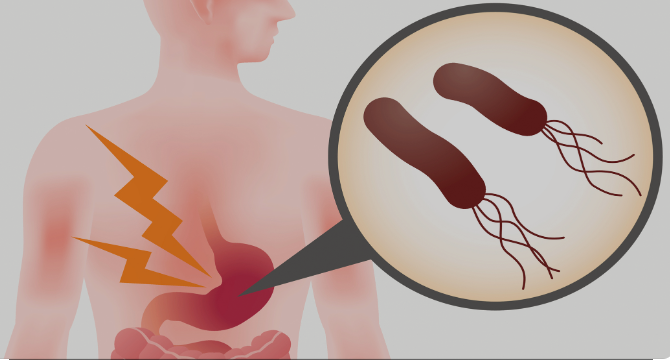Test Helicobacte
Download / Print Section as PDF


The second Irish Helicobacter pylori Working Group consensus for the diagnosis and treatment of Helicobacter pylori infection in adult patients in Ireland
Sinéad M. Smitha, *, Breida Boyleb, Martin Buckleyc, Conor Costigana,d, Maeve Doylee, Richard Farrellf , M. Syafiq Ismailg, David Kevansa,h, Sean Nugenti , Anthony O’Connora,d, Colm O’Moraina, Vikrant Pariharj , Cristín Ryank and Deirdre McNamaraa,d, *
Background
There has been an increase in resistance to many of the antimicrobials used to treat Helicobacter pylori (H.pylori) nationally and internationally. Primary clarithromycin resistance and dual clarithromycin and metronidazole resistance are high in Ireland. These trends call for an evaluation of best-practice management strategies.
Objective
The objective of this study was to revise the recommendations for the management of H. pylori infection in adult patients in the Irish healthcare setting.
Methods
The Irish H. pylori working group (IHPWG) was established in 2016 and reconvened in 2023 to evaluate the most up-to-date literature on H. pylori diagnosis, eradication rates and antimicrobial resistance. The ‘GRADE’ approach was then used to rate the quality of available evidence and grade the resulting recommendations.
Results
The Irish H. pylori working group agreed on 14 consensus statements. Key recommendations include (1) routine antimicrobial susceptibility testing to guide therapy is no longer recommended other than for clarithromycin susceptibility testing for first-line treatment (statements 6 and 9), (2) clarithromycin triple therapy should only be prescribed as first-line therapy in cases where clarithromycin susceptibility has been confirmed (statement 9), (3) bismuth quadruple therapy (proton pump inhibitor, bismuth, metronidazole, tetracycline) is the recommended first-line therapy if clarithromycin resistance is unknown or confirmed (statement 10), (4) bismuth quadruple therapy with a proton pump inhibitor, levofloxacin and amoxicillin is the recommended second-line treatment (statement 11) and (5) rifabutin amoxicillin triple therapy is the recommend rescue therapy (statement 12).
Conclusion
These recommendations are intended to provide the most relevant current best-practice guidelines for the management of H. pylori infection in adults in Ireland. Eur J Gastroenterol Hepatol XXX: XXXX–XXXX
Copyright © 2024 The Author(s). Published by Wolters Kluwer Health, Inc.
European Journal of Gastroenterology & Hepatology XXX,
XXX:XXXX–XXXX
Keywords: antimicrobial resistance, bismuth, clarithromycin, consensus guidelines, Helicobacter pylori, levofloxacin, quadruple therapy, rifabutin, tetracycline, triple therapy
a
School of Medicine, Trinity College Dublin,
b
Department of Clinical Microbiology, St. James’s Hospital, Dublin,
c
Department of Gastroenterology, Mercy University Hospital, Cork,
d
Department of Gastroenterology, Tallaght University Hospital, Dublin,
e
Department of Microbiology, University Hospital Waterford, Waterford,
f
Department of Gastroenterology, Connolly Hospital, RCSI, Dublin,
g
Department of Gastroenterology, Cavan and Monaghan Hospital,
h
Department of Gastroenterology, St. James’s Hospital, Dublin,
i
Department of Gastroenterology, Whitfield Clinic, Waterford,
j
Department of Gastroenterology, Letterkenny University Hospital, and
k
School of Pharmacy and Pharmaceutical Sciences, Trinity College Dublin, Dublin, Ireland
Correspondence to Sinéad M. Smith, PhD, Trinity Academic Gastroenterology
Group Research Centre, Rm 1.46 Department of Clinical Medicine, Trinity
Centre, Tallaght University Hospital, Dublin 24, Ireland
Tel: +353 1 896 3844; fax: +353 1 896 2988; e-mail: smithsi@tcd.ie
This is an open-access article distributed under the terms of the Creative Commons Attribution-Non Commercial-No Derivatives License 4.0 (CCBY-NC-ND), where it is permissible to download and share the work provided it is properly cited. The work cannot be changed in any way or used commercially without permission from the journal.
*Sinead M. Smith and Deirdre McNamara contributed equally to the writing of
this article.
Received
25 January 2024
Accepted
8 May 2024.
0954-691X Copyright © 2024 The Author(s). Published by Wolters Kluwer Health, Inc.
Download / Print Section as PDF
part A
boratory-based enzyme immunoassays and more recently rapid immunochromatography-based tests for point-of-care diagnosis. In relation to laboratory-based tests, mAb-based assays are superior to polyclonal-based tests [32]. While studies evaluating rapid near-patient immunochromatography-based stool antigen tests are emerging, inferior performance compared to laboratorybased tests has been reported for primary H. pylori diagnosis [33–36]. Therefore, the monoclonal stool antigen test is recommended over both polyclonal laboratory-based tests and rapid immunochromatography-based assays. T

